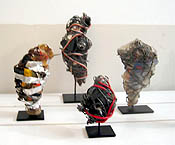What is a lap? It exists only when we are sitting down, disappears the instant we rise. It, in some sense, is a fold in the body that is not the body as such, but which cannot exist without it. A lap is also a complete circuit such as one might make swimming or else running a circular or perhaps elliptical track. Again, it is neither the track nor the pool but only our circuit of this space – it cannot exist without it. Somewhere between these very different meanings, something exists that is, in a positive sense, a lap. Let’s call it
It is that positive, but ultimately unnamable space, that is the focal point of Rachel Blau DuPlessis’ longpoem Drafts. Poem after poem circles, crosses, comes to this place, never – at least through the first 38 sections – completely to inhabit it, precisely because it resists habitation. It dissolves the minute you stand up.
I have been reading Drafts it feels like forever. Reading any individual section, tho, is – or has always felt so me to me – much like first reading one of Pound’s Cantos or a new section of Zukofsky’s “A” – it’s not something you can do lightly. Reading any individual Draft is completely exhausting in much the same sense that climbing a very steep hill forces one to marshal & deploy all of one’s resources. Having now finally completed the first big Wesleyan volume, I find myself overwhelmed with the grief that is the inevitable consequence of completing a life-changing text. It’s something even the most compulsive or ambitious reader (I’m neither of those) gets to feel only rarely in one life. It has been ages since I felt it in mine with such depth or fullness.
For me, the key text in this first volume is Draft 33, “Deixis,” a poem that casts every earlier poem in a new, deeper light, gave meaning to DuPlessis’ process of “folding” texts – identifying, so to speak, the location of the lap in each – transforming all of Draft’s stuttering & muttering – the very first Draft begins after all on an almost preliterate note, seeing the horizon of the alps, or something very much like it, in the shape of a capital N – into, in fact, the poem’s most articulate moments. Thus I understand – tho it has taken me this long to realize it – why that first Draft, composed some 19 years ago, should itself be entitled or subtitled “It.”
A friend said to me awhile back that they were surprised by my support for DuPlessis’ project, that she seemed so much more of a rationalist than I’m usually given to liking. That, tho, is her strong suit, her Objectivist or post-Objectivist heritage & what I think she shares with poets as diverse as Louis Zukofsky & Barrett Watten – the poet who sees their project in terms not alien to science, even if it is a science less of incremental testing & retesting & more of the cosmological sweep of thought we associate with Einstein, Leonardo or Goethe’s Faust.
The next volume, with the complicated title of Drafts – Drafts 39-57, Pledge, with Draft, Unnumbered: Précis, is of course already waiting, with its cover image of sculptures by the Philadelphia Wireman – the topic of earlier Draft 22¹ – and the first published map of the Drafts scheme to date, built around that most curious prime number, 19. At the rate I’m going, DuPlessis may actually have completed the poem entirely by the time I complete this volume – tho I note that its 20 sections take over 220 pages, where the first 38 took “just” 267 – there’s hope yet that a single Draft might scale to the size of “A”-12 if not longer. So I find myself setting forth on this next book with the sense – hope even – that there are worlds yet ahead to be discovered & that I plan to indulge myself completely, taking the time necessary fully to get there.
¹ The Philadelphia Wireman was an anonymous folk sculptor whose marvelous constructions were found one day in a vacant lot in 1982, discarded perhaps because the artist had died & his (or her) space was being cleared for new tenants. Everything else that is known about him (or her) must be deduced from the works.







